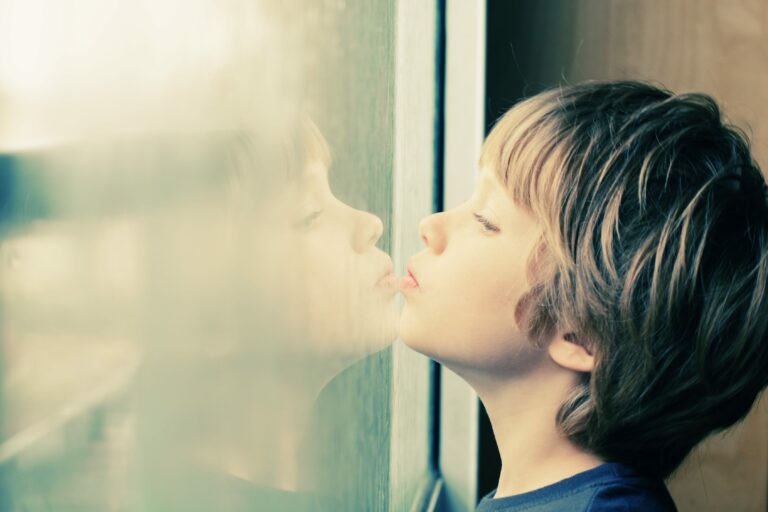It is true that children who have speech impairments are more likely to be teased or bullied than their “typical peers.” According to a study by Professor Gordon W. Blood, Ph.D., CCC-SLP children who stutter are 61% more likely to be targeted by a bully. Blood stated that “bullies tend to look for shy, timid children who appear withdrawn and have poor social and communication skills–hallmarks of certain childhood developmental disorders, including stuttering, autism, and other speech-language impairments” (Blood, 2012). Research shows us that this starts early on. Exclusion in preschool is associated with future peer rejection (Conti-Ramsden G, Botting N.2004). Research shows that preschoolers with communication disorders have fewer positive social interactions with peers. Negative peer perception occurs with older children with communication disorders.
Teasing? Bullying? What difference does it make?
What is teasing?
Teasing is a social exchange or interaction. Children often tease other children to provoke a reaction. It generally involves a sense of play and mutual joking around. When a child is being teased, they can generally help determine whether it continues or ends. Teasing can be friendly, neutral or negative. It is not usually meant to be hurtful, however when the person being teased becomes distressed, it can be negative and weaken the relationship.
What is bullying?
Bullying is meant to be hurtful. “Bullying is unwanted, aggressive behavior among school aged children that involves a real or perceived power imbalance. The behavior is repeated, or has the potential to be repeated over time.” (www.stopbullying.gov)
So who really bullies other children?
Popular individuals have power over peers and are less likely to get in trouble for bullying. Some children who are “loners” may engage in retaliatory bullying against younger/weaker children. Boys tend to bully more than girls, though girls seem more likely to engage in relational bullying.
Why does bullying happen?
Bullying happens when children are trying to establish their place in the social hierarchy. It often happens when children are transitioning from one school to another such as when middle school occurs.
What is the best thing to do?
Your goal as a parent is to prevent your child from being bullied and to raise your child to feel good about who they are, having strong self-esteem. We want our children to feel as if they can do anything they want to do!
Peggy Moss, a nationally known expert on bullying says to let your child talk about it. Listen in a non-judgmental way about your child and about the teaser(s) or bully(s). Let your child do the talking. Ask your child, “What happened? How did that make you feel?” Your child needs to know that they are being heard and that their feelings matter. Praise your child for being honest about what is happening and coming forward.
Try to find out more and get the whole story. As noted television psychologist Dr. Phil McGraw says, “No matter how flat you make a pancake, there are two sides to it.” Give your child the time they need to organize and formulate their thoughts. Children with communication difficulty may find it especially challenging to speak about emotionally laden situations.
Depending on your child’s ability to problem solve you can empower your child so s/he feels as if they are solving the problem. You can ask questions like: “What do you think you can say next time?” Help your child work through their solution by saying, “What do you think is going to happen if you do that?” or “What’s going to make you feel better about this situation?”
Build your child’s confidence. Your child’s confidence is likely strained after this experience. Praise your child’s strengths in areas unrelated to speaking.
Encourage your child to build his or her social network – one or two friends makes a big difference when it comes to being a target of a bully. They are less likely to pick on a child. You want your child to be able to say, “I never really had that problem because I had friends to back me up.” Invite others over for play dates or to hang out.
Help your child develop social communication skills and anti-bullying strategies. Some social communication therapy groups work on developing better peer relationships. They may teach children about the nature of bullying (e.g., why students bully others, that bullying is not their fault). They may help children to develop and role-play assertive communication.
Consult with your child’s teacher. Inform the teacher of what your child has said so she can watch for this at school. It is often helpful to meet with your child’s teacher before the beginning of the school year to discuss your child’s speech impairment. It can be helpful to share classroom management strategies with the teacher. Your child’s speech-language pathologist would be happy to provide this for your child.
Encourage your child to seek help from the school speech pathologist if your child has qualified to receive school services. School speech pathologists can likely help your child deal with teasing and bullying. Many help create inclusive environments for students. The SLP may be willing to speak to your child’s class about speech disorders.
There are times when a child cannot speak to a parent about this. Make sure to find them a safe person they do feel comfortable speaking to. It is the only way to get at the crux of the problem.
How do you explain to your child about their speech impairment?
When the time is right, you can speak with your child about his/her speech impairment in an appropriate way. Some parents do this prior to their child entering kindergarten just in case their child is teased. Sometimes parents speak to their children when they begin to wonder why s/he has to work so hard on something that comes so easily to others -talking.
Try a dialogue like this with your child:
“Naturally, we are all different. The word different is not a bad thing at all. We all have different strengths and different weaknesses. Strengths are the things that are brain makes easy for us. Weaknesses are the things that are brain doesn’t make easy for us. Some people are great with numbers and math. Some people are great athletes- they may run or swim fast. Some people are great artists, drawing amazing pictures. Some people are really good at being social- they are outgoing and friendly. We all have things we are good at, just as we all have things that are weaknesses. Your dad is fabulous with numbers and math, but I am not. I struggle with math and always have to check my work and sometimes have your dad check it! I am really good with writing, but not everyone is. You are really good at swimming and computers, but speech is harder for you. Just think about all the people you know that wear glasses. I wear glasses! People that wear glasses need help seeing, just like you need some help with your speech.”
“Now here is the thing, some kids who don’t know you and understand how smart you are, may judge you based on how you talk. They might do the same thing to the child that has difficulty with math. When people do this it is because they don’t feel good about themselves, or they don’t feel as smart as you. So don’t get angry with kids like that, just try to remember they don’t really know you. We love you, so always let us know if someone ever says anything bad to you.”
Resources
- A federal government website managed by the U.S. Department of Health and Human Services
- PACER’s bullying prevention resources are designed to benefit all students, including students with disabilities.
References
- Bullies Likelier to Target Students with Speech-Language Disorders; Speech-Language Pathologists Positioned to Help. (2012, May 22). Retrieved from https://www.prweb.com/releases/2012/5/prweb9531539.htm
- Conti-Ramsden G, Botting N. Social difficulties and victimization in children with SLI at 11 years of age. Journal of Speech Language and Hearing Research 2004;47(1):145-161.
- Guralnick, M. J., Connor, R. T., Hammond, M. A., Gottman, J. M., & Kinnish, K. (1996). The Peer Relations of Preschool Children with Communication Disorders. Child Development, 67(2), 471. doi:10.2307/1131827
- How to Prevent, Deal with Bullying of a Speech Impaired/Special Needs Child. (2012, July 9). Retrieved from https://pursuitofresearch.org/2012/07/09/how-to-prevent-deal-with-bullying-of-a-speech-impairedspecial-needs-child/
- Is Your Child Being Bullied Because of a Speech or Language Disorder? (2016, September 21). Retrieved from https://www.speechtherapycentres.com/bullying-from-speech-language-disorder/
- Moss, P., What to do if your Child is Bullied – Help Kids Deal with Bullies. (n.d.). Retrieved from https://www.empoweringparents.com/article/my-child-is-being-bullied-what-should-i-do/
- Murphy. (n.d.). Retrieved from https://www.mnsu.edu/comdis/ISAD3/papers/murphy.html
- My Child is Being Teased for her Speech Impediment. (2014, April 18). Retrieved from https://www.speechbuddy.com/blog/speech-therapist/child-speech-impediment/





